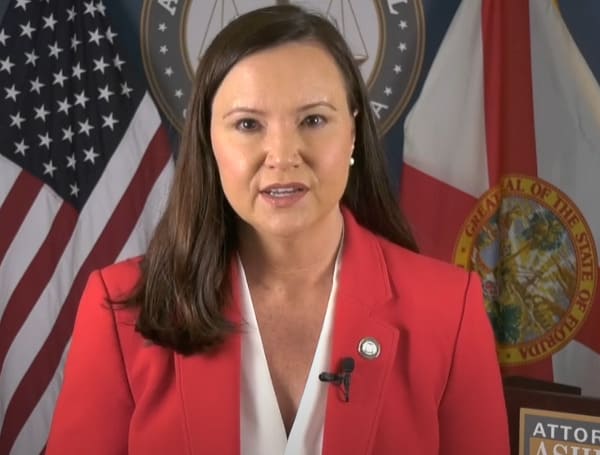Florida Attorney General Ashley Moody was among more than two dozen Republican AGs urging the Supreme Court to overturn the Colorado decision to toss former President Donald Trump off the state’s 2024 ballot.
The U.S. Supreme Court agreed on Friday to hear Trump’s appeal to the decision by Colorado’s high court. A majority of four Democrats on the state Supreme Court determined that Trump should go under the 14th Amendment.
On Friday, twenty-seven state attorneys general, led by Todd Rokita of Indiana and Patrick Morrisey of West Virginia, filed a brief arguing that the U.S. Supreme Court should take the case and overrule Colorado.
Read: Secretary Of Defense Lloyd Austin Addresses Lack Of Transparency Surrounding Hospitalization
Moody did not issue any public comments on the brief so far. But in court records, the GOP AGs maintain that Colorado’s decision, if upheld, would throw the election into “chaos.”
“The state court’s choice to declare former President Donald Trump an insurrectionist under Section 3 of the Fourteenth Amendment has vast consequences that reach far beyond Colorado,” the AGs wrote in their brief.
“No State is an electoral island’ because ‘the impact of the votes cast in each State is affected by the votes cast’ — or, in this case, not cast — ‘in other States,’” they argued, adding that their respective states “have a strong interest in protecting their electorates from actions that dilute their citizens’ choices.”
The AGs offered several reasons why the election interference of the Colorado justices cannot stand.
The first: “It threatens to throw the 2024 presidential election into chaos.”
Read: Florida AG Moody Releases 2022 Hate Crime Data: State Reports 229 Incidents
“Voters who may wish to cast their ballots for former President Trump cannot know whether he ultimately will be excluded from the ballot in their State or others. They may wonder whether a little non-mutual offensive collateral estoppel is all it takes for former President Trump to be excluded from ballots across the Nation,” they wrote.
“So will voters risk casting their votes for a candidate who might be later disqualified in some or all States? If they do, what becomes of their votes? … Voters need an answer in time to judiciously weigh the merits of competing candidates before casting their ballots, not after voting has begun. An authoritative answer from this Court is needed to prevent the situation from deteriorating further.”
Moreover, they added, “For elections to be fair, voters need a single, certain answer as to whether someone is ineligible for President under Section 3 of the Fourteenth Amendment. If left to the ‘courts of 50 states,’ litigation over a candidate’s eligibility for President will result in ‘conflicting rulings and delayed transition of power in derogation of statutory and constitutional deadlines.’”
As for other reasons to overturn Colorado’s effort to “dilute” Trump’s support, the AGs noted that the Colorado court ruled on a question that the Constitution left to Congress.
“The court purported to decide what events might constitute an ‘insurrection’ even though the definition rests on a series of purely political judgments — not legal ones,” they argued.
“To make matters worse, the Colorado courts decided ‘complicated’ constitutional questions through a truncated state process that denied former President Trump any opportunity for ‘basic discovery, the ability to subpoena documents and compel witnesses, workable timeframes to adequately investigate and develop defenses, and the opportunity for a fair trial.’”
The AGs further pointed out that “Congress will decide whether a particular person is qualified to hold office under Section 3 (or at least determine the process for making that decision),” and with that in mind, the U.S. Supreme Court “should grant (Trump’s) Petition to prevent state courts from usurping Congress’s exclusive power.”
Additionally, they wrote, “In deciding that former President Trump engaged in insurrection, the Colorado court fashioned a definition of ‘insurrection’ that is standardless and vague. The best available evidence suggests that insurrection equates with rebellion — a more demanding standard than the Colorado Court settled on. But what constitutes insurrection is not a question courts should answer at all.”
“If the Colorado decision stands, that critical confidence [voters must have in the electoral process] will be harmed. Many Americans will become convinced that a few partisan actors have contrived to take a political decision out of ordinary voters’ hands,” the AGs concluded.
Android Users, Click To Download The Free Press App And Never Miss A Story. Follow Us On Facebook and Twitter. Sign up for our free newsletter.
We can’t do this without your help. Visit our GiveSendGo page and donate any dollar amount; every penny helps.
